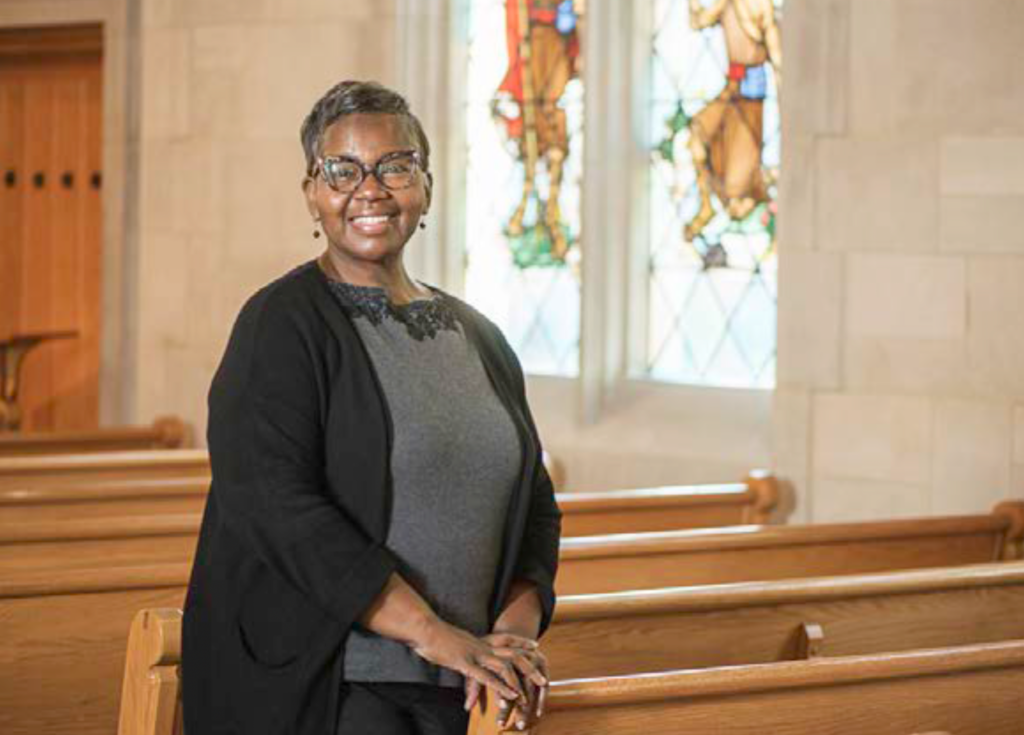
By Melanie Raskin
Angela Beard specializes in seeing the unseen, hearing the unheard, and remembering the forgotten. She’s a board- certified transitional care chaplain working with people experiencing homelessness. Part of Atrium Health Wake Forest Baptist Medical Center’s Chaplaincy and Education Program in Winston-Salem, NC, she answers the call to care from the moment people who are unhoused enter the hospital, and sometimes long after they are released. As the liaison between the hospital and community shelters, churches and agencies, she connects patients to housing, food, transportation, follow-up medical appointments and, most important of all, a kind smile and a helping hand.
“To me, living a life of dignity and respect is a big part of healing and being restored,” Beard says. “It’s not intended for us to live alone in this world. We need each other to survive.”
Spiritual care has been a part of Baptist Hospital since its founding in 1923. Today’s program spans 5 community hospitals and is comprised of chaplains; chaplain managers; chaplain residents and interns; first responder chaplains ministering to law enforcement, fire and rescue workers; and certified educators teaching chaplain interns and residents. Services are delivered 24/7 and include:
- Culturally sensitive spiritual support and advocacy for hospital patients, families and staff
- Spiritual counseling
- Education and support for medical students, residents and others on professional development, ethics and palliative care
- Code Lavender, a program which assists hospital staff in troubled times, such as during the COVID-19 pandemic
According to director Emily Viverette, the program’s objective is whole-person care.
“People are hurting,” she says. “Patients and staff are coming to us in crisis and anxiety. Chaplains can show up, provide a calm presence, and lean in and listen for potential places of healing. While we believe everyone is responsible for spiritual care, chaplains are specialists in elevating
Elevating Hope
Beard feels caring and nonjudgmental relationships are the key to elevating hope. She recalls one man who was homeless and unable to get a much-needed hip replacement because he had no family to help him. His health was rapidly deteriorating. That’s when Beard stepped in, taking him to all pre-op appointments, giving him a ride to the surgery, sitting with him in recovery, being his eyes and ears during consultations with the medical team, and supporting his travel and recuperation at home.
“Life happens and so many suffer alone in silence,” Beard says. “It’s so much easier to talk things out with another person, not looking for an answer necessarily, but just to walk the path together and share the burden. I’m here in Spirit, meeting people where they are, as the hands and feet of God to help them be restored and receive what they need.”
Resilience, compassion and hope are the lynchpins of the Chaplaincy and Education Program, a service that is still evolving after nearly a century.
“Instead of looking at what’s wrong with people and how to help them be better, we focus on their spiritual strengths and resources,” Viverette says. “We accompany people, trusting that they already have what they need to help them through painful circumstances. Sometimes, they simply need a listening ear to access their internal and external resources. It’s a strengths-based caring model that looks at what’s right in people to bolster and support them through difficult times.”
